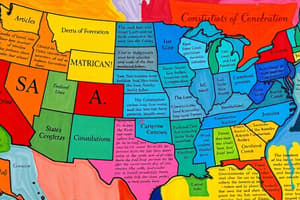Podcast
Questions and Answers
What was a major consequence of the lack of a judicial branch under the Articles of Confederation?
What was a major consequence of the lack of a judicial branch under the Articles of Confederation?
- There was a persistent inability to resolve interstate disputes. (correct)
- States could independently negotiate treaties with foreign nations.
- Federal laws were more effective in maintaining order.
- States could override federal laws.
Which factor made it exceedingly difficult to amend the Articles of Confederation?
Which factor made it exceedingly difficult to amend the Articles of Confederation?
- The requirement for a simple majority vote.
- The necessity of a unanimous vote from all states. (correct)
- The lack of support from the individual states.
- The ability of Congress to impose amendments unilaterally.
How did the Articles of Confederation reflect the historical context of the American Revolution?
How did the Articles of Confederation reflect the historical context of the American Revolution?
- They aimed to establish a strong national government.
- They were shaped by colonial grievances against centralized authority. (correct)
- They empowered a national executive branch to enforce laws.
- They centralized power similar to British rule.
Which provision of the Articles of Confederation directly limited the national government's powers?
Which provision of the Articles of Confederation directly limited the national government's powers?
What was one of the key characteristics of the Confederation Congress as established by the Articles?
What was one of the key characteristics of the Confederation Congress as established by the Articles?
What was a primary role of the central government under the Articles of Confederation?
What was a primary role of the central government under the Articles of Confederation?
Which of the following was a significant weakness of the Articles of Confederation?
Which of the following was a significant weakness of the Articles of Confederation?
What event was motivated by the inadequacies of the Articles of Confederation?
What event was motivated by the inadequacies of the Articles of Confederation?
How did the Articles of Confederation impact the power distribution between states and the federal government?
How did the Articles of Confederation impact the power distribution between states and the federal government?
Which of the following was a strength of the Articles of Confederation?
Which of the following was a strength of the Articles of Confederation?
What was one of the key issues that arose due to the lack of a strong central government under the Articles of Confederation?
What was one of the key issues that arose due to the lack of a strong central government under the Articles of Confederation?
What principle was established by the Articles of Confederation regarding government?
What principle was established by the Articles of Confederation regarding government?
What economic issue was exacerbated by the lack of a national currency under the Articles of Confederation?
What economic issue was exacerbated by the lack of a national currency under the Articles of Confederation?
Flashcards
Articles of Confederation's Purpose
Articles of Confederation's Purpose
The first attempt at a national government for the US, creating a weak central government with limited powers among the 13 states.
State Power Under Articles
State Power Under Articles
States held significant power over taxation, commerce, and law making, limiting the central government's role.
Articles of Confederation
Articles of Confederation
The first governing document of the newly formed United States, emphasizing state sovereignty and limiting central power.
Interstate Disputes Resolution
Interstate Disputes Resolution
Signup and view all the flashcards
Articles of Confederation's Impact
Articles of Confederation's Impact
Signup and view all the flashcards
Weaknesses of Articles - taxation
Weaknesses of Articles - taxation
Signup and view all the flashcards
Amendment Difficulty
Amendment Difficulty
Signup and view all the flashcards
Weaknesses of Articles- Commerce
Weaknesses of Articles- Commerce
Signup and view all the flashcards
Limited National Power
Limited National Power
Signup and view all the flashcards
Economic Turmoil
Economic Turmoil
Signup and view all the flashcards
Weaknesses of Articles - Executive Branch
Weaknesses of Articles - Executive Branch
Signup and view all the flashcards
Treaty of Paris and Articles
Treaty of Paris and Articles
Signup and view all the flashcards
Strengths of Articles - Union
Strengths of Articles - Union
Signup and view all the flashcards
Study Notes
The Articles of Confederation
- The Articles of Confederation were the first attempt at a national government for the newly independent United States.
- Established a "league of friendship" among the 13 states, recognizing their autonomy.
- Created a weak central government with limited powers.
State vs. Federal Powers Under the Articles
- The Articles of Confederation established a system with significantly more power residing with the individual states.
- The central government had limited authority, primarily focused on defense and foreign relations.
- Key areas where states retained considerable power included taxation, commerce regulation, and lawmaking affecting their residents.
- This decentralized structure hindered the national government's ability to effectively address issues facing the nation and its citizens
Impact on the Constitution
- The inadequacies and failures of the Articles of Confederation became a catalyst for the Constitutional Convention of 1787.
- The weaknesses—like the inability to levy taxes, regulate commerce, and effectively enforce laws—motivated the Founding Fathers to create a stronger central government.
- The Constitution sought to correct the shortcomings of the previous system by distributing power more effectively between the federal government and the states and granting more substantial authority to the national government.
Strengths of the Articles of Confederation
- Established a formal union among 13 states after declaring independence.
- Successfully guided the nation through the American Revolutionary War.
- Successfully negotiated the Treaty of Paris in 1783, securing American independence and establishing international recognition.
- Established principles of states' rights and limited government, important considerations in the founding period.
Weaknesses of the Articles of Confederation
- Lacked a strong central government with substantial powers.
- Central government held little to no power over the states or their citizens.
- Failed to address internal conflict and regulate commerce.
- Failed to adequately address and respond to economic crises.
- Inability of the national government to collect taxes effectively led to financial instability.
- Lack of a national currency created economic confusion among different states and the country as a whole.
- Lack of an executive branch weakened enforcement and created considerable delays and inefficiencies.
- Lack of a judicial branch prevented the resolution of interstate disputes.
- Difficulty amending the document. A unanimous vote by all states was necessary, making changes incredibly difficult to achieve.
- Inability of the national government to regulate interstate commerce or tariffs created substantial economic turmoil.
Historical Context
- The Articles of Confederation were created in the immediate aftermath of the American Revolutionary War and shaped by colonial grievances with the British monarchy.
- The colonists aimed to create a government that was not overly powerful and that protected individual freedoms. This fear of central authority heavily influenced the structure of the Articles.
- The Articles reflected an apprehension towards centralized power. This was influenced by the colonists' experiences under British rule.
- The Articles of Confederation reflected an attempt to establish a balanced system where individual states maintained significant control over their affairs.
Key Provisions of the Articles of Confederation
- Established a "league of friendship" among the states.
- Created a unicameral (one-house) legislature called the Confederation Congress, with each state having one vote.
- Granted Congress limited powers, such as the power to declare war, make treaties, and settle disputes among states.
- The Confederation Congress had no power to tax.
- No executive branch or national court system.
Studying That Suits You
Use AI to generate personalized quizzes and flashcards to suit your learning preferences.
Description
This quiz explores the Articles of Confederation, the first governing document of the United States, highlighting its strengths and weaknesses. Key topics include the balance of powers between state and federal authorities, and how these issues led to the creation of the U.S. Constitution.




